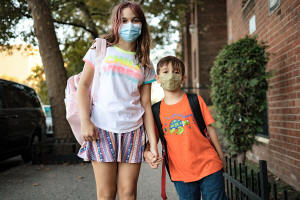Relief, anxiety as U.S. parents confront emotional back to school
 Send a link to a friend
Send a link to a friend
 [September 27, 2021]
By Maria Caspani [September 27, 2021]
By Maria Caspani
NEW YORK (Reuters) - Kelly Toth was "very
relieved" when her four sons went back to school in person at the end of
August after more than a year of pandemic restrictions.
For the first couple of weeks, however, Toth said she also wrestled with
an unexpected "anxiousness." She found it strange not knowing what her
children were doing in school after she monitored their education
closely during the last academic year.
Many parents in the United States are grappling with a host of emotions,
taking extraordinary steps and making COVID-19 tests and vaccines part
of the back-to-school routine.
Like Toth, some said relief at getting their kids back into classrooms
full time - in her case in a district where indoor masking is currently
mandatory - is mixed with worry about safety. The highly contagious
Delta variant of the coronavirus has led to a surge in hospitalizations,
including among children.
That fear is at times compounded by the deep political fault lines
evident in wildly different approaches taken by U.S. schools on issues
such as masking.

In the previous academic year Toth, 39, a Schnecksville, Pennsylvania
physician's assistant, juggled her children's education with long shifts
in the emergency room under the crush of COVID-19. She and her husband,
a small business owner, tried their best to help with schooling but had
"no idea what we were doing," she recalled.
"I almost felt like I couldn't enjoy being with them because it was
always just the stress of, 'we have to do this assignment, we have to do
this'," she said of her sons, ages 7, 8, 12 and 14.
This year, despite worry over Delta, "I feel like I can be their mom
again and not this controlling entity in their life," she said.
'I WANT TO KEEP MY CHILDREN SAFE'
The Delta variant has sent infections among young children soaring.
Those under 12 years of age are particularly vulnerable as they are not
yet eligible for vaccination.
That could change in the coming months. Pfizer and BioNTech said last
week they plan as soon as possible to ask for regulatory authorization
for their vaccine in children ages 5 to 11.
"I would definitely get my children vaccinated," said New York City
mother Jodi Cook, whose son and daughter are both under 12. "It's a
dangerous disease and I want to keep my children safe."

While Cook's 11-year-old daughter attended classes at a Brooklyn private
school throughout the pandemic, her 7-year-old son struggled during
periods of remote learning at his school. Both children are special
needs learners, she said.
"I just feel like it's worth the risk," Cook said about sending them
both back to the classroom full time. "It was just too hard trying to
keep them mentally healthy at home."
COVID-19 outbreaks this year have already sent students back to remote
or hybrid learning, at least temporarily, in many U.S. schools. There
have been over 2,000 in-person school closures in K through 12
institutions in 39 states since August, according to data aggregator
Burbio.com .
As worries over the Delta variant grew this summer, the Center on
Reinventing Public Education (CRPE) at the University of Washington
Bothell looked at 100 large urban school districts in the United States.
[to top of second column]
|

Special needs children Gianna Tesoriero, 11 and Roberto Tesoriero,
7, pose for a portrait in Brooklyn, New York, U.S., September 20,
2021. REUTERS/Hannah Beier

At the end of July, it found just 41% offered a
remote learning option, at least to some students. Less than two
months later, only six of the 100 districts do not offer remote
learning, CRPE's Communication Director Laura Mann said by email.
Brian Corley's two daughters learned in person throughout the past
academic year, when masks were mandatory in their Birmingham,
Alabama district.
Masks now are optional, Corley said, despite a deadly COVID-19 surge
in Alabama, where vaccination rates are low.
The school policy has frustrated Corley and his wife, whose youngest
daughter contracted an infection in early childhood that left her
legally blind. Her previous history with viruses has her parents
worried about how she might fare if she were to contract COVID-19.
"I don't think it's a terrible stretch to ask for our children, in
schools, to be required to wear masks," Corley said.
LIVING WITH WORRY
Many U.S. parents have qualms about sending their children back to
school. Only about one quarter of parents who responded to a
nationwide online survey https://www.pta.org/home/About-National-Parent-Teacher-Association/PTA-Newsroom/news-list/news-detail-page/2021/09/02/new-national-survey-and-listening-sessions-reveal-parents-mindsets-as-children-return-to-school
for the National Parent Teacher Association released earlier this
month said they feel "very comfortable" with their children
returning to the classroom.

Chief among concerns is their child contracting COVID-19 at school
and a return to remote learning, according to the survey.
Artist and dog walker Allison Rentz signed up her 12-year-old son
for in-person classes this year, calling it a "difficult" decision
she made, in part, for his mental well-being.
Rentz said she has been testing her son for the coronavirus once a
week with an at-home kit, and has him wear a KN95 mask at school.
The single mother drives him to and from his middle school in the
Atlanta area, fearful crowded buses could be unsafe, and picks him
up at lunchtime to keep him out of the cafeteria. They eat together
in their car in the school's lot.
"He hates that I check him out every day," Rentz, 46, said in a
phone interview. "That's what I had to do in order to feel
comfortable."
(Reporting by Maria Caspani in New York; Additional reporting by
Hannah Beier in New York and Schnecksville, Pennsylvania; Editing by
Donna Bryson and Bill Berkrot)
[© 2021 Thomson Reuters. All rights
reserved.] Copyright 2021 Reuters. All rights reserved. This material may not be published,
broadcast, rewritten or redistributed.
Thompson Reuters is solely responsible for this content.
 |